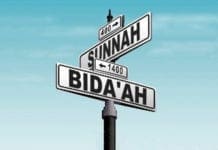This variety may be divided into three types, namely the Sunnah which the Prophet laid down in his capacities:
1. As Messenger of God,
2. As the Head of State or imam,
3. Or in his capacity as a judge.
We shall discuss each of these separately, as follows:
(a) In his capacity as Messenger of God,
In this capacity, the Sunnah may consist of a clarification of the ambiguous (mujmal) parts of the Qur’an or specifying and qualifying the general and the absolute contents of the Qur’an. Whatever the Prophet has authorized pertaining the principles of religion, especially in the area of devotional matters (ibadat) and rules expounding the lawful and the unlawful, that is, the Halal and haram, constitutes general legislation (tashri’ ‘amm).  All commands and prohibitions that are imposed by the Sunnah are binding on every Muslim regardless of individual circumstances, social status, or Political office. In acting upon these laws, the individual normally does not need any prior authorization by a religious leader or the government. [35. Shaltut, Al-Islam, p. 513.]
All commands and prohibitions that are imposed by the Sunnah are binding on every Muslim regardless of individual circumstances, social status, or Political office. In acting upon these laws, the individual normally does not need any prior authorization by a religious leader or the government. [35. Shaltut, Al-Islam, p. 513.]
The question arises as to how it is determined that the Prophet acted in one or the other of his three capacities as mentioned above. The uncertainty which has arisen in answering this question in particular cases is, in fact, one of the main causes of juristic disagreement (ikhtilaf). An enquiry of this nature helps to provide an indication as to the value of the Sunnah in question: whether it constitutes an obligation, commendation, or ibadah on the one hand, or a prohibition or abomination (karahah) on the other.
When the direction of an act is known from the evidence in the sources, there remains no doubt as to its value. If, for example, the prophet attempts to explain an ambiguous ruling of the Qur’an, the explanation so provided would fall in the same category of values as the original ruling itself.
 According to the majority of ulema, if the ambiguous of the Qur’an is known to be obligatory’ or commendable, the explanatory Sunnah would carry the same value. For example, all the practical instructions of the Prophet which explained and illustrated the obligatory Salah would be wajib and his acts pertaining to the superiority prayers such as Salah on the occasion of lunar and solar eclipse salat al-khusuf wa al-kusuf) would be mandub. [36. Badran, Bayan, p. 41.]
According to the majority of ulema, if the ambiguous of the Qur’an is known to be obligatory’ or commendable, the explanatory Sunnah would carry the same value. For example, all the practical instructions of the Prophet which explained and illustrated the obligatory Salah would be wajib and his acts pertaining to the superiority prayers such as Salah on the occasion of lunar and solar eclipse salat al-khusuf wa al-kusuf) would be mandub. [36. Badran, Bayan, p. 41.]
Alternatively, the Sunnah may itself provide a clear indication as to whether it is wajib, mandub, or merely permissible.
Additionally, the subject-matter of the Sunnah may provide a sign. With regard to prayers, for example, the adhan and iqamah are indications as to the obligatory nature of the prayer. For it is known that they precede the obligatory Salah only. A salah which is not obligatory such as the ‘id prayer, or Salat al-istisqa’ (‘prayers offered at the time of drought’), are not preceded by them.
Another method of evaluating an act is by looking at its opposite, that is, its absence. If it is concluded that the act in question would have been in the nature of a prohibition had it not been authorized by the Prophet, then this would imply that it is obligatory. For example, circumcision consists essentially of the infliction of injury for no obvious cause, had it not been made into an obligation, then it would presumably be unlawful. This is applicable to all penalties the Shari’ah prescribed.
Lastly, an act may require the belated performance (qada’) of a wajib or a mandub, and as such its value would correspond to that of its prompt performance (ada’). [37. Hitu, p. 275]
If no such verification is possible, then one must look at the intention behind its enactment. If a Prophetic act is intended as a means of seeking the pleasure of God, then it is classified as mandub; and according to a variant view, as wajib. If the intention could not be detected either, then it is classified as wajib, and according to a variant view as mandub. [38. Hitu, p. 276.]











